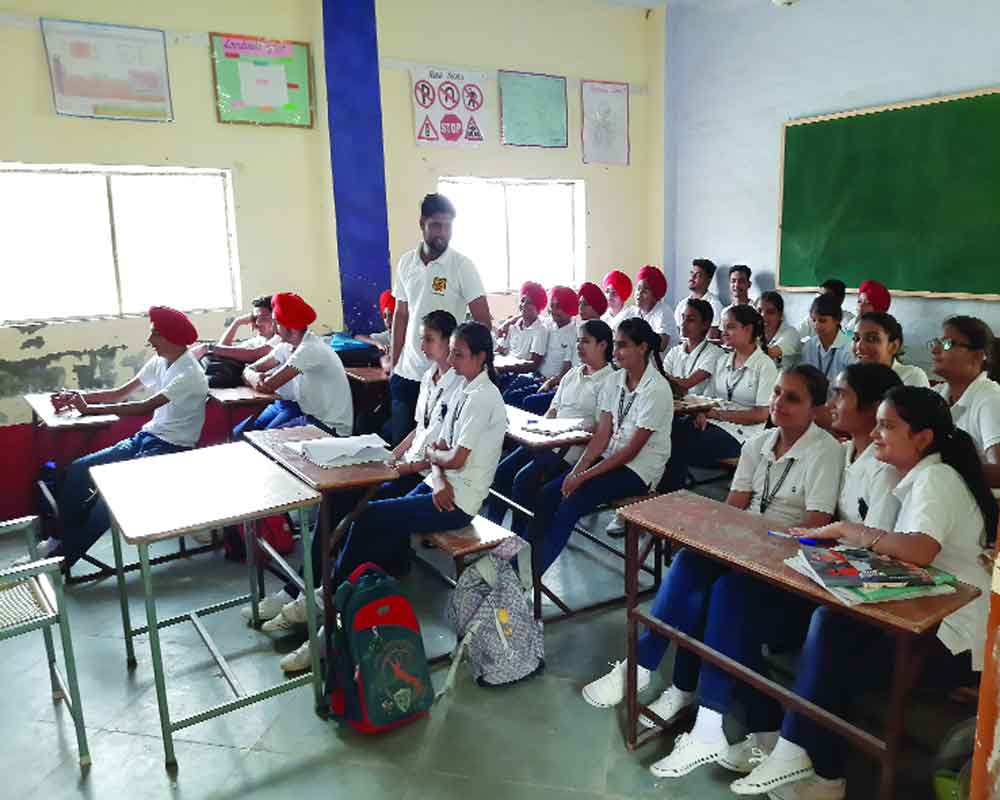The Indian education system stands at a crossroads, poised between recognition and realisation of its inherent potential
Looking back from the transition point to the third millennium, it could indeed be interesting—and revealing—as to what was the most encouraging achievement in the pivotal sector of education! The most mentioned of the responses to the query from seasoned academics and scholars, as well as the policymakers who had contributed to policy formulation and implementation for three-four decades, referred to the change in social responses from various strata of society.
The most serious impediment was ignorance of the value of education in the lives of the individual and the family. One wonders whether anything more could be expected from a society seriously emaciated for centuries, and subjected to live their lives in abject misery! Social structures that practised exclusion, seriously flawed assumptions on the role of women and its relationship to female literacy, and the excruciating hold of the clergy in deprecating the education of girls were indeed serious handicaps before all those who were assigned to implement the constitutional directive of providing free and compulsory education to all children till they achieve fourteen years of age!
The widely prevalent practice of early marriage, child labour, compulsions to earn daily bread, and the need for extra hands in farms and fields, were also prominent factors that severely impeded the process of enrolment in schools. It may be tough for the millennials to visualise a situation that for decades together, girls’ education in India suffered for want of toilets for girls in schools. This is one area that remained neglected all along.
After the Prime Minister of India spoke from the ramparts of the Red Fort about sanitation practices, and the need for immediate reforms, things have changed, and this deserves appreciation. However, considerable alertness and appreciation of the need are still necessary. Why do I say this? What one learns from personal interactions just cannot always be extricated from data!
In 2016, one visited several institutions as a member of the TSR Subramaniam Committee on Education policy. In one of the colleges with an enrollment of around two thousand, a mention was made of the neglect of sanitation, the Director had this to say: Oh, it is too dirty and unhygienic for me to inspect! I mention this for two reasons; first; the systems of education paid little attention to such a significant impediment. Second; even after the universally acknowledged and appreciated movement for sanitation, and its great success, there is much more to be achieved on this front!
We are much better off at this juncture in educational achievements, particularly in the context of girls’ participation in education and subsequently in every sector of knowledge, skills, services, defence and the like. What was the most ignored aspect of Indian education during the second half of the 20th century? Some academics and scholars—adherents of negativity included—would like to criticise all that has been done and achieved during this period.
Those who are, ideologically unconstrained and capable of taking an objective analytical view express concern about certain aspects that are essential ingredients total the personality development of any individual. This is usually articulated in every policy and programme, but current education practices get ignored in schools and even certain well-reputed institutions. Moral and ethical aspects of education, education in human values, and similar expressions are regular parts of every education initiative.
We also have the legacy of Mahatma Gandhi, who could say “My life is my message”! How many of our present-day leaders—political leaders—could say that with inner conviction and confidence? There are still the old guards and young ones who took Gandhi, Rajendra Prasad, Rajagopalachari, Karpuri Thakur, LK Advani, Narendra Modi, and the like as their role models.
A committed work culture, a sound value system, and a pursuit of higher and larger goals in life could only be inculcated in educational institutions and that remains a big challenge before the Indian education system. Our advantage is that we are familiar with how it could be achieved.
Indian education has achieved sufficient recognition and success; within and outside the country. India and its ancient education systems aimed at comprehensive personality development, the comprehension of ‘Ekam Sat Viprah Baudha Vadanti, ‘Sarv bhut Hite Ratah’, ‘Sarve Bhavantu Sukhina”, and much more on similar lines. We were privileged that MK Gandhi gave us a practical model of education that focused on enhancing the economic aspect but did not neglect this totality, and wanted the best to be drawn out of out of head, hand and heart. Sri Aurobindo; and the mother; dwelled in higher echelons of human advancement, apart from what is usually aimed at imparting education.
Our education initiatives and efforts, it must be acknowledged; drifted more towards the acquisition of education for material and physical gains. Education, said the Mother; is not to prepare learners to succeed in life and society but ‘to increase his perfectibility’! Addressing the students of the Ashram Schools she said: “Do not aim for success. Our aim is perfection.
Remember you are on the hold of a new world, participating in its worth and instrumental in its creation. There is nothing more important than the transformation. There is no interest more worthwhile.” The Mother goes on to delineate it further for our comprehension: “To learn for the sake of knowledge, to study to know the secrets of Nature and life, to educate oneself to grow in consciousness, to discipline oneself to become master of oneself, to overcome one’s weaknesses, incapacities, and ignorance, to prepare oneself to advance in life towards a goal that is nobler and vaster, more generous and truer…”
Could anything more need be said on how our schools and institutions could move ahead in pursuit of excellence once they absorb the golden words and the strength of the philosophy behind them?
(The author works in education, social cohesion and religious amity, views are personal)


























